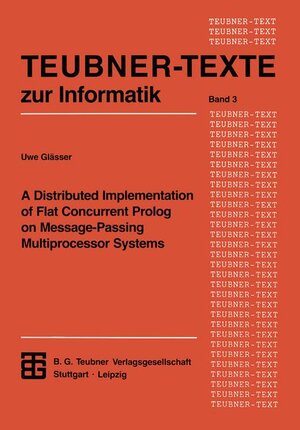
×
![Buchcover ISBN 9783815420515]()
A Distributed Implementation of Flat Concurrent Prolog on Message-Passing Multiprocessor Systems
mit Uwe GlässerInhaltsverzeichnis
- 1 Introduction and Overview.
- 1.1 General Introduction.
- 1.2 Significance of the Work.
- 1.3 Overall Organization.
- 1.4 Syntax of Logic Programs.
- 1.5 Data Manipulation by Unification.
- 2 Concurrent Logic Programming.
- 2.1 Process Interpretation of Logic Programs.
- 2.1.1 The Process Model.
- 2.1.2 Computational Behaviour.
- 2.1.3 General Language Classification.
- 2.2 Data-Flow Synchronization Techniques.
- 2.2.1 Process Synchronization.
- 2.2.2 Atomicity of Unification.
- 2.2.3 Specification of Synchronization.
- 2.2.4 Overall Comparison.
- 2.3 Operational Semantics of FCP.
- 2.3.1 FCP Data-Flow Synchronization.
- 2.3.2 An Abstract FCP Interpreter.
- 2.3.3 Formal Description of Computations.
- 2.3.4 An Example for an FCP Program.
- 3 Design of an Abstract FCP Machine.
- 3.1 The Process Reduction Mechanism.
- 3.1.1 Complexity Issues.
- 3.1.2 The Process Reduction-Cycle.
- 3.2 The Abstract Machine Model.
- 3.2.1 A Sequential FCP Machine.
- 3.2.2 Functional Machine Architecture.
- 3.2.3 Process Scheduling.
- 4 Concepts for a Distributed Implementation.
- 4.1 Abstract System Architecture.
- 4.1.1 Parallelization.
- 4.1.2 Scalability.
- 4.1.3 Communication and Synchronization.
- 4.2 Distributed Data Representation.
- 4.2.1 Data Representation at the Application Layer.
- 4.2.2 Data Representation at the Machine Layer.
- 4.2.3 Representation of Non-Variable Terms.
- 4.2.4 Representation of Logical Variables.
- 4.2.5 Representation of Process Structures.
- 4.2.6 Distribution of Process Strucures.
- 4.3 The Distributed Reduction Algorithm.
- 4.3.1 Variable Migration.
- 4.3.2 Synchronizing Reduction Operations.
- 4.3.3 Distributed Process Suspension.
- 4.3.4 Observations on Complexity.
- 4.4 Distributed Termination Detection.
- 4.5 Multiprogramming Facilities.
- 4.6 Deadlock and Livelock Prevention.
- 4.6.1 Prevention of Livelocks.
- 4.6.2 Prevention of Deadlocks.
- 4.6.3 Detection of Livelocks.
- 4.6.4 A Combined Approach.
- 4.7 Dynamic Work Load Balancing.
- 4.7.1 The Process Selection Policy.
- 4.7.2 The Load Balancing Policy.
- 4.8 Distributed Garbage Collection.
- 4.9 Related Work.
- 5 Implementing FCP on Large Transputer Networks.
- 5.1 Parallel Machine Architecture.
- 5.2 Reduction Unit Architecture.
- 5.2.1 The Reducer Subunit.
- 5.2.2 The Distributor Subunit.
- 5.2.3 The Router Subunit.
- 5.3 Host Unit Architecture.
- 6 Performance Measurements and Optimizations.
- 6.1 Performance Measures.
- 6.2 Possible Optimizations.
- 7 Conclusions.




